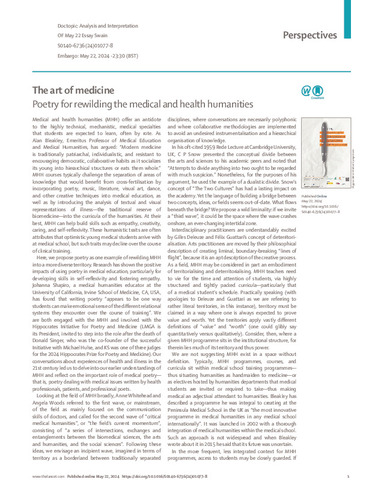Poetry for rewilding the medical and health humanities
Autor(es) y otros:
Editor/Coord./Trad.:
Fecha de publicación:
Versión del editor:
Citación:
Descripción física:
Resumen:
Medical and health humanities (MHH) offer an antidote to the highly technical, mechanistic, medical specialties that students are expected to learn, often by rote. As Alan Bleakley, Emeritus Professor of Medical Education and Medical Humanities, has argued: “Modern medicine is traditionally patriarchal, individualistic, and resistant to encouraging democratic, collaborative habits as it socializes its young into hierarchical structures or eats them whole.” MHH courses typically challenge the separation of areas of knowledge that would benefit from cross-fertilisation by incorporating poetry, music, literature, visual art, dance, and other creative techniques into medical education, as well as by introducing the analysis of textual and visual representations of illness—the traditional reserve of biomedicine—into the curricula of the humanities. At their best, MHH can help build skills such as empathy, creativity, caring, and self-reflexivity. These humanistic traits are often attributes that optimistic young medical students arrive with at medical school, but such traits may decline over the course of clinical training.
Medical and health humanities (MHH) offer an antidote to the highly technical, mechanistic, medical specialties that students are expected to learn, often by rote. As Alan Bleakley, Emeritus Professor of Medical Education and Medical Humanities, has argued: “Modern medicine is traditionally patriarchal, individualistic, and resistant to encouraging democratic, collaborative habits as it socializes its young into hierarchical structures or eats them whole.” MHH courses typically challenge the separation of areas of knowledge that would benefit from cross-fertilisation by incorporating poetry, music, literature, visual art, dance, and other creative techniques into medical education, as well as by introducing the analysis of textual and visual representations of illness—the traditional reserve of biomedicine—into the curricula of the humanities. At their best, MHH can help build skills such as empathy, creativity, caring, and self-reflexivity. These humanistic traits are often attributes that optimistic young medical students arrive with at medical school, but such traits may decline over the course of clinical training.
Patrocinado por:
LMGA is the President of the Hippocrates Initiative for Poetry and Medicine, the Principal Researcher of the research group HEAL: Health, Environment, Arts and Literature, and was Principal Researcher of the project END: Illness in the Age of Extinction (funded by the Spanish National Research programme PID2019-109565RB-I00/AEI). KS is the author of Darwin's Microscope, Atlantic, Opera di Cera, Double the Stars, The Naked Muse, and Ophelia Swam; she taught Humanities in Global Health at Imperial College London (2012\u201314) and is currently undertaking a PhD in the subject at the University of Tasmania, working with poetry and medical students.
Colecciones
- Artículos [37541]
- Filología Inglesa, Francesa y Alemana [587]
Ficheros en el ítem





